

The volume of this self-proclaimed renewal of history was thus announced as “a necessary work of revision” which “is simultaneously imposed – a type of breviary of corrections and errata, in which the process of the various black legends which demoralize the august face of our Past is instructed. With the objective to show us Portugal above all as a moral personality, prolonging itself undivided and continuous, such a History, when it is made without falling into excessive detail, should also not forget the corresponding revision of preconceived judgements and concepts” (À sombra dos pórticos, cit., 90). This passed by the refutation of liberal theses, since only through counter-revolutionary mediations of history “can we in this way understand what Liberalism was in Portugal and how the Republic, its bastard or legitimate daughter – little does it matter! – slots directly into it”. And hence the choice of a historiography that would favour the biographies of great men as being longer summaries of each age (and in this way Sardinha clearly increased his predilection for genealogy and Livros de Linhagens (Books of Nobility) which married well with his monarchical and anticonstitutional profession of faith). A further example - the rehabilitation of D. Miguel - brought with it “the legitimacy of dynastic right and the legitimacy of national choice”, a paradigm of the reaction against the “series of muddles, armed robberies and effrontery” of the “imported constitutionalism” of 1820 (Ao ritmo da ampulheta, pp. 209-210), the source of a procession of innumerable “errata in the history “ of Portugal which swarmed over the Estado Novo and made historical science the ideological must of nationalism.
The ambitious programme for a never-written História de Portugal (History of Portugal), of which only the outline posthumously published by Rodrigues Cavalheiro (1928) is known, gives the clear idea that it would be the integral prospectus of the historiographical revision by the hand of Sardinha, based on political study and with the deliberate purpose of analysing the nation as a living organism endowed with animus, will and soul, appropriating the old metaphor of Romanticism to which sociologism and organicism had lent a scientific tonality since the last quarter of the 19th century, mating them with the ordeirista ideas of sociability and hierarchy (family, corporation, municipality, Church and unitarian State).
